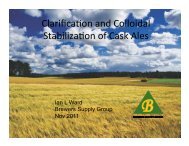Program Book - Master Brewers Association of the Americas
Program Book - Master Brewers Association of the Americas
Program Book - Master Brewers Association of the Americas
Create successful ePaper yourself
Turn your PDF publications into a flip-book with our unique Google optimized e-Paper software.
<strong>Program</strong><br />
HCC denotes Hawaii Convention Center; HHV denotes Hilton Hawaiian Village<br />
Daily Schedule — Saturday, August 2<br />
8:00 a.m. – 3:00 p.m. ASBC Pre-congress Course: Fact-Based Microbiological Compliance* HCC 303 A/B<br />
8:00 a.m. – 5:00 p.m. ASBC Pre-congress Course: Introduction to Design <strong>of</strong> Experiments for <strong>Brewers</strong>* HCC 302 A/B<br />
1:00 – 5:00 p.m. MBAA Pre-congress Course: Advanced Yeast* HCC 306 A/B<br />
1:00 – 5:00 p.m. MBAA Pre-congress Course: Topics in Brewery Environmental Engineering* HCC 305 A/B<br />
2:00 – 5:30 p.m. Registration HCC Kamehameha Hall I<br />
2:00 – 5:30 p.m. Poster Set Up HCC Kamehameha Hall I<br />
2:00 – 5:30 p.m. Speaker Ready Kiosk HCC Kamehameha Hall I<br />
2:00 – 6:00 p.m. Congress Hospitality Lounge HHV Tapa Ballroom 1<br />
2:00 – 7:00 p.m. Exhibit Set Up HCC Kamehameha Hall I<br />
6:30 – 9:00 p.m. Welcome Reception** HHV Super Pool<br />
9:00 – 11:00 p.m. Congress Hospitality Lounge HHV Tapa Ballroom 1<br />
Pre-congress Course: Fact-Based Microbiological<br />
Compliance<br />
Organized by American Society <strong>of</strong> Brewing Chemists<br />
8:00 a.m. – 3:00 p.m. • HCC 303 A/B<br />
Joe Dirksen, Ecolab Inc.; Bob Taylor, Miller Brewing Company;<br />
Chad Thompson, Ecolab Inc.<br />
<strong>Brewers</strong> are constantly fighting an uphill battle to eradicate<br />
beer-spoiling microorganisms, reach performance metrics, and<br />
achieve microcontrol using traditional microbiological techniques,<br />
approaches, and sampling and testing plans. Traditional programs<br />
produce <strong>the</strong> same poor results; it’s time to throw it all away and<br />
start over. Fact-based microbiological compliance (FBMC) is an<br />
integrated systems approach that goes against <strong>the</strong> conventional<br />
wisdom <strong>of</strong> traditional, extensive microsampling and plating<br />
programs as <strong>the</strong> cornerstone and will yield superior, sustainable<br />
microperformance. FBMC integrates <strong>the</strong> following key system<br />
components: process and sub-process chunking; cleaning systems<br />
and equipment performance; cleaning and sanitizing solutions;<br />
cleaning procedures; system, sub-system, and component<br />
inspections; cleaning and sanitizing effectiveness; operator<br />
inspections: tanks, lines, turn-backs, matrix valves; system and<br />
design failures; environmental impact; operation and operator<br />
practices. Attendees will be thoroughly exposed to FBMC concepts<br />
and tools, so <strong>the</strong>y can begin implementing FBMC immediately<br />
in <strong>the</strong>ir respective breweries, achieving expected, superior, and<br />
sustainable microperformance.<br />
Pre-congress Course: Introduction to Design <strong>of</strong><br />
Experiments for <strong>Brewers</strong><br />
Organized by American Society <strong>of</strong> Brewing Chemists<br />
8:00 a.m. – 5:00 p.m. • HCC 302 A/B<br />
Eric Johann Samp, Molson-Coors Brewing Company<br />
The experimental design techniques covered in this introductory<br />
course will provide brewing pr<strong>of</strong>essionals with statistical tools for<br />
constructing tests with multiple factors using orthogonal factorial<br />
designs. Discover how to determine <strong>the</strong> statistical significance <strong>of</strong><br />
<strong>the</strong> impact <strong>of</strong> individual factors on responses, identify interactions,<br />
and interpret <strong>the</strong>m when changing more than one factor at a time.<br />
22<br />
* Additional registration required for this event.<br />
** Guests must purchase a ticket to attend this event.<br />
In addition, reducing experimental test sizes using fractionating<br />
full factorials will be covered, along with interpretation <strong>of</strong> design<br />
resolution and techniques to determine it. Examples on how to<br />
interpret computer-generated outputs will also be provided. O<strong>the</strong>r<br />
topics include how to test for higher order effects, block for variables<br />
that cannot be easily randomized, determine <strong>the</strong> path <strong>of</strong> steepest<br />
ascent/decent, conduct screening designs, and deal with multiple<br />
responses. This course will provide powerful tools for technical<br />
brewers, engineers, scientists, chemists, process managers,<br />
microbiologists, quality control pr<strong>of</strong>essionals, and o<strong>the</strong>rs involved<br />
in process control, process optimization, R&D, new product<br />
development, and analytical chemistry method development. Basic<br />
knowledge <strong>of</strong> algebra is a prerequisite. Participants must bring <strong>the</strong>ir<br />
own calculator for <strong>the</strong> hands-on exercises.<br />
Pre-congress Course: Advanced Yeast<br />
Organized by <strong>Master</strong> <strong>Brewers</strong> <strong>Association</strong> <strong>of</strong> <strong>the</strong> <strong>Americas</strong><br />
1:00 – 5:00 p.m. • HCC 306 A/B<br />
Olau Nielson, Alfa Laval Scandi Brew; Alex Speers, Dalhousie<br />
University; Jens Voigt, Weihenstephan Technical University; Peter<br />
Rogers, Fosters Australia; Graeme Walker, University <strong>of</strong> Abertay<br />
Moderators: Inge Russell, Alltech, Inc.; Graham Stewart,<br />
International Centre for Brewing and Distilling<br />
The fermentation process has been intensely studied for many years,<br />
but many aspects <strong>of</strong> yeast fermentation are still not well understood.<br />
This is not a basic yeast workshop, but ra<strong>the</strong>r it is an advanced<br />
workshop focusing on <strong>the</strong> latest published and unpublished yeast<br />
research. How we grow and handle <strong>the</strong> yeast affects its health and<br />
also <strong>the</strong> stability <strong>of</strong> <strong>the</strong> beer. Now <strong>the</strong>re are new techniques that<br />
we can use to measure, with greater accuracy, whe<strong>the</strong>r <strong>the</strong> yeast<br />
is damaged by factors such as centrifugation, storage, and lack <strong>of</strong><br />
nutrients. The workshop will <strong>of</strong>fer insights into why fermentation<br />
problems occur, as well as discussions <strong>of</strong> practical solutions. It will<br />
include short lectures by leading experts and time for interaction<br />
and discussion among participants.



